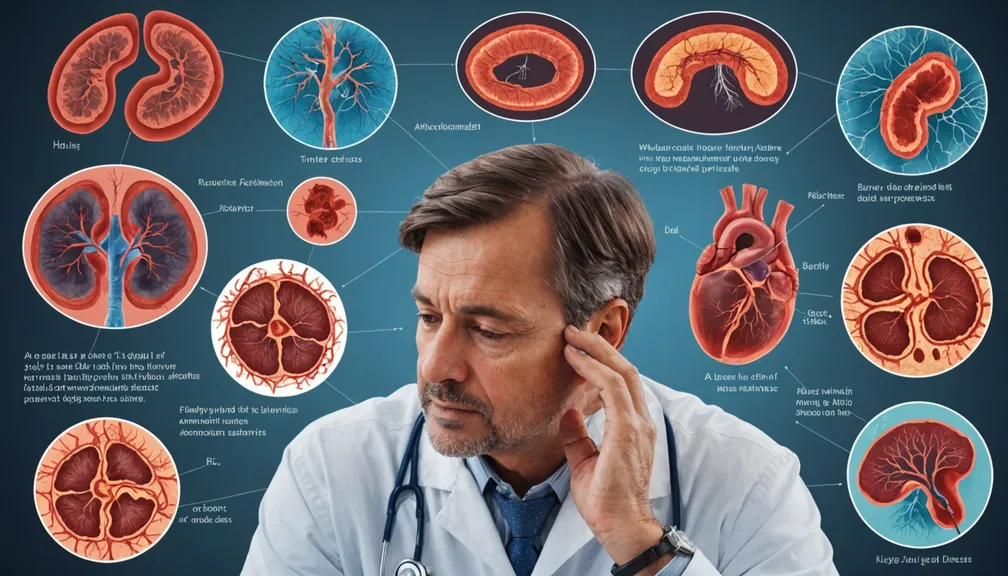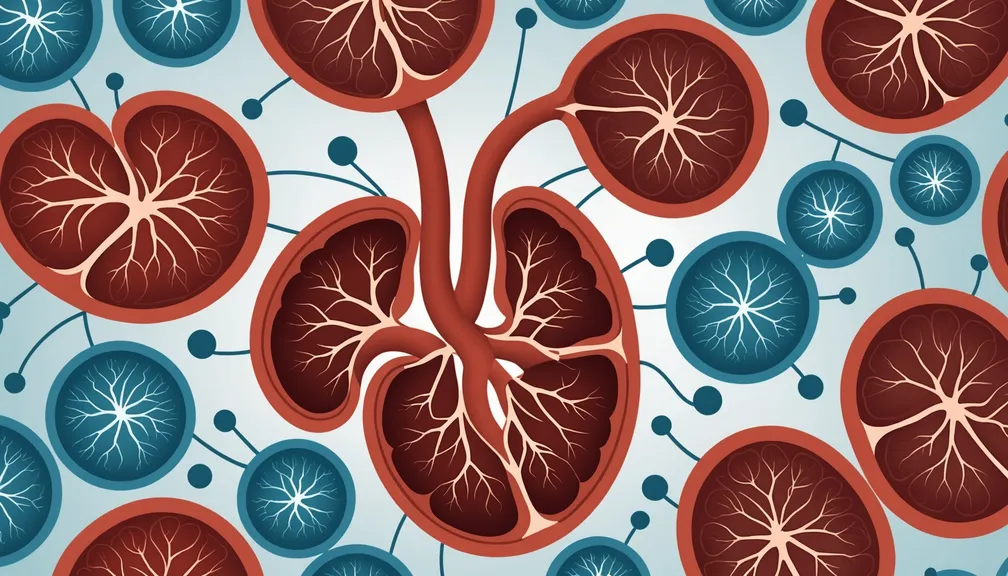Treatment Options: Medications, Dialysis, and Transplantation
Medications
Purpose of Medications
Medications are essential in managing rare kidney diseases. They help:
- Control Symptoms: Alleviate discomfort and manage specific symptoms related to kidney dysfunction.
- Slow Disease Progression: Delay the advancement of kidney damage.
- Prevent Complications: Reduce the risk of other health issues that can arise from kidney disease.
Common Medications for Rare Kidney Diseases
- Angiotensin-Converting Enzyme (ACE) Inhibitors and Angiotensin II Receptor Blockers (ARBs):
- Function: Help lower blood pressure and reduce protein loss in the urine.
-
Benefits: Protect kidney function and slow disease progression.
-
Immunosuppressants:
- Function: Suppress the immune system to prevent it from attacking the kidneys.
-
Use Case: Particularly important in conditions like Alport syndrome.
-
Diuretics:
- Function: Help the body eliminate excess fluid.
-
Benefits: Reduce swelling and ease the workload on the kidneys.
-
Erythropoietin-Stimulating Agents (ESAs):
- Function: Stimulate the production of red blood cells.
- Use Case: Treat anemia, a common complication of kidney disease.
Managing Side Effects
- Stay Informed: Understand the potential side effects of each medication.
- Communicate with Your Doctor: Report any adverse reactions or unusual symptoms immediately.
- Do Not Stop Medications Abruptly: Always consult your healthcare provider before making changes to your medication regimen.
Importance of Adherence
- Consistency is Key: Taking medications as prescribed ensures they work effectively.
- Prevent Worsening of Disease: Adhering to your medication schedule can slow kidney damage and prevent complications.
- Better Quality of Life: Proper medication management can improve overall well-being and daily functioning.
Dialysis
What is Dialysis?
Dialysis is a life-sustaining treatment that performs the essential functions of healthy kidneys by removing waste products and excess fluids from the blood when the kidneys are no longer able to do so effectively.
Types of Dialysis
- Hemodialysis
- How It Works: Blood is filtered through a machine outside the body.
- Frequency: Typically performed three times a week.
- Duration: Each session lasts about four hours.
-
Setting: Usually done at a dialysis center, but home hemodialysis is also an option for some patients.
-
Peritoneal Dialysis
- How It Works: Uses the lining of the abdomen (peritoneum) to filter blood inside the body.
- Types:
- Continuous Ambulatory Peritoneal Dialysis (CAPD): Performed manually, usually four times a day.
- Automated Peritoneal Dialysis (APD): Uses a machine to perform exchanges at night.
- Duration: Each exchange takes about 30 minutes.
- Setting: Can be done at home, offering more flexibility and independence.
Preparing for Dialysis
- Vascular Access Creation: For hemodialysis, a fistula or graft is created to allow easy access to the bloodstream.
- Training: Patients undergoing home dialysis receive training to perform the treatment safely and effectively.
- Lifestyle Adjustments: Adapting daily routines to accommodate dialysis schedules and dietary restrictions.
Living with Dialysis
- Diet and Fluid Management:
- Restricting Certain Foods: Limit intake of potassium, phosphorus, and sodium.
-
Managing Fluid Intake: Prevent fluid overload and maintain electrolyte balance.
-
Emotional Support:
- Support Groups: Connect with others undergoing dialysis for shared experiences and encouragement.
-
Counseling Services: Professional support to cope with the emotional challenges of dialysis.
-
Physical Activity: Engage in appropriate exercises to maintain strength and overall health, as advised by your healthcare team.
Transplantation
Kidney Transplant Overview
A kidney transplant involves placing a healthy kidney from a donor into a person with kidney failure. It can offer a more active and flexible lifestyle compared to long-term dialysis.
Eligibility and Evaluation
- Medical Assessment: Comprehensive health evaluation to ensure suitability for surgery and transplantation.
- Compatibility Testing: Includes blood type matching, tissue typing, and cross-matching to prevent rejection.
- Psychosocial Evaluation: Assesses mental readiness, support systems, and ability to adhere to post-transplant care.
The Transplant Process
- Finding a Donor:
- Living Donors: Family members or friends who are willing and compatible.
-
Deceased Donors: Individuals who have donated their organs after death.
-
Surgery:
- Procedure: The new kidney is placed in the lower abdomen, and blood vessels and ureter are connected.
-
Recovery: Hospital stay typically lasts one week, with gradual return to normal activities.
-
Post-Transplant Care:
- Monitoring: Regular blood tests to check kidney function and detect any signs of rejection.
- Medications: Lifelong immunosuppressive drugs to prevent the body from rejecting the new kidney.
Post-Transplant Care and Medications
- Immunosuppressive Therapy:
- Purpose: Prevent the immune system from attacking the transplanted kidney.
-
Medication Regimen: Requires strict adherence to medication schedules to maintain kidney health.
-
Lifestyle Adjustments:
- Healthy Diet: Balanced nutrition to support overall health and kidney function.
- Regular Exercise: Maintain physical fitness and reduce the risk of complications.
-
Avoid Infections: Practice good hygiene and avoid exposure to infectious agents.
-
Regular Follow-Ups:
- Appointments: Frequent check-ups with your transplant team to monitor health and kidney function.
- Laboratory Tests: Routine blood tests to ensure medications are effective and adjust dosages as needed.
Supporting Healthcare Professionals
Managing rare kidney diseases involves a multidisciplinary team of healthcare professionals who provide comprehensive care and support:
- Nephrologists:
-
Role: Specialists in kidney health who oversee treatment plans and manage kidney-related conditions.
-
Transplant Surgeons:
-
Role: Perform kidney transplant surgeries and manage post-operative care.
-
Dialysis Nurses:
-
Role: Assist during dialysis sessions, monitor patient health, and provide education on dialysis procedures.
-
Dietitians:
-
Role: Create personalized meal plans to meet dietary needs and manage fluid and electrolyte balance.
-
Pharmacists:
-
Role: Manage medications, provide education on drug interactions, and ensure proper medication adherence.
-
Social Workers and Counselors:
-
Role: Offer emotional support, help navigate healthcare systems, and assist with practical needs such as transportation and financial issues.
-
Physical Therapists:
- Role: Develop exercise programs to maintain strength and mobility, tailored to individual health statuses.
Working with Your Healthcare Team
- Open Communication: Share your concerns, symptoms, and questions openly with your healthcare providers.
- Active Participation: Take an active role in your treatment plan by understanding your options and making informed decisions.
- Support Systems: Utilize the expertise of your healthcare team to address all aspects of your health and well-being.
Remember, managing a rare kidney disease is a journey that involves various treatment options and a dedicated team of healthcare professionals. Understanding your treatment choices empowers you to take an active role in preserving your kidney function and improving your quality of life.






